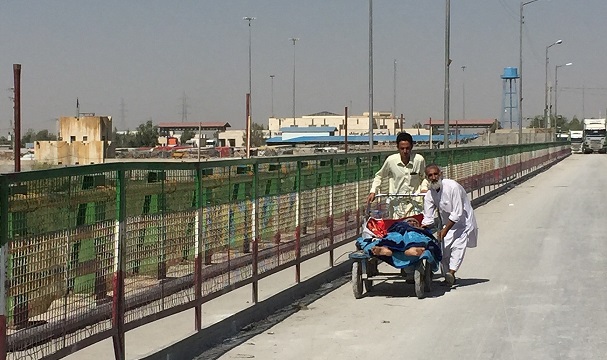Kabul 16 December 2017
World Health Organization, in cooperation with International Organization for Migration (IOM) and Medical Refresher Courses for Afghans (MRCA), a French NGO working in the health sector, supports improvement of trauma care facilities in Milak border crossing point transit centre in Nimroz province.
Milak is the busiest border crossing point for undocumented refugees in Afghanistan. The crossing point has been under increased influx of refugees recently and the existing services at the Zaranj border, where the crossing point is located, are overstretched.
 Injured patients are transported from Iran to Afghanistan in make-shift cart. WHO will support referral and transport of injured patients to transit centre. Photo: WHO / David Lai
Injured patients are transported from Iran to Afghanistan in make-shift cart. WHO will support referral and transport of injured patients to transit centre. Photo: WHO / David Lai
The project, which was initiated in October, will address the urgent health needs of returnees at the transit centre and complement the local health services, to support coping with the increase demand.
Kabul 16 December 2017
World Health Organization, in cooperation with International Organization for Migration (IOM) and Medical Refresher Courses for Afghans (MRCA), a French NGO working in the health sector, supports improvement of trauma care facilities in Milak border crossing point transit centre in Nimroz province.
Milak is the busiest border crossing point for undocumented refugees in Afghanistan. The crossing point has been under increased influx of refugees recently and the existing services at the Zaranj border, where the crossing point is located, are overstretched.
 Injured patients are transported from Iran to Afghanistan in make-shift cart. WHO will support referral and transport of injured patients to transit centre. Photo: WHO / David Lai
Injured patients are transported from Iran to Afghanistan in make-shift cart. WHO will support referral and transport of injured patients to transit centre. Photo: WHO / David Lai
The project, which was initiated in October, will address the urgent health needs of returnees at the transit centre and complement the local health services, to support coping with the increase demand.
Zaranj Border is the official entry point through which 90% of undocumented returnees have crossed this year. Since January 2017, over 190,000 undocumented Afghans have returned to Afghanistan from Iran through the Milak border crossing. Presently, over 1,500 returnees are crossing daily with 40,000-60,000 crossing per month. Closure of the Islam Qala border crossing in Herat province for undocumented Afghans has further increased pressure on Milak. As of 12 August, approximately 10,000 undocumented Afghans have crossed at Milak every week and overall around 180,000 undocumented Afghans have returned in 2017.
For the local health sector, the provision of emergency health services is at a breaking point. The conditions of the current health clinics are inadequate to meet existing demand and will be unable to provide blanket vaccination coverage to all undocumented returnee children under 10 and TB screening for all undocumented returnees. In addition, essential health service delivery (including psycho-social support, maternal and newborn care, health education and referral) could not be guaranteed without additional staff, equipment and medical supplies.
Groups who are at particular risk and are in need of special attention include unaccompanied women and children, the elderly, and the disabled. They often suffer from mobility challenges and are subjected to heightened levels of anxiety and trauma induced by the conflict and displacement.
There are at least 30 to 50 trauma cases per day crossing the Zaranj border. These cases are often the result of conflict or targeted injuries. The current facilities do not have the capacity to support trauma care and patients have to find their way to Herat Regional Hospital.
Effective trauma care needs to be in place at Point Zero and Transit Centre with proper ambulances for patient transfer. In addition, regional facilities need to be upgraded to support referral care. Lastly, dead body management needs to be strengthened.
The new WHO-supported activities will ensure that the facilities at the border can continue to provide these essential life-saving services. The activities supported by WHO in Nimroz include site planning, establishment of facilities and effective triaging of patients, resource and capacity enhancement to assess vulnerable undocumented returnees; minimum assistance for services required at the border and incentives to ensure that people seek assistance.









